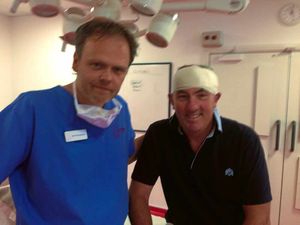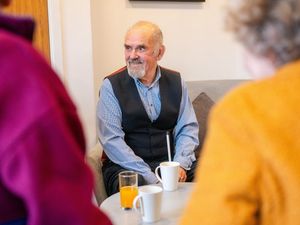Playing with fire - Lurking danger of summer sun
We've all been there – the chance to relax and take in some rays; the necessary evil of a little reddening in order to achieve that perfect tan.
But face the facts. Invest in tanning now and you are increasingly likely to be facing the prospect of cancer in the future.
That is what is happening to a generation who knew nothing of the dangers of the sun as they were growing up in the 50s, 60s and 70s.
They are now reaping what they sowed. Any many are dying as a result.
The British Skin Foundation says more than half of us worry less about skin cancer than any other form of the disease.
Plus, the majority of us underestimate the risk of developing skin cancer, and how many people in the UK are diagnosed with malignant melanoma, the most serious form, every year – with 38 per cent unaware that the condition can be fatal.
Are you taking more precautions than you used to against the danger of skin cancer? Vote in our poll and have your say in the comment box below.
Are we still not 100 per cent convinced that the British sun's hot enough to do us any real damage? Or has the message just not sunk in properly yet?
As summer heats up, the Shropshire Star today provides the answer to some of the myths that still surround issue.
Skin cancer doesn't really kill many people in the UK.
False: Around 100,000 new cases are diagnosed each year, making skin cancer the most common cancer in the UK. It is easily treated but still kills around 2,500 a year, the equivalent of seven people a day – the overwhelming majority of these will have malignant melanoma which, worryingly, is on the rise.
"If skin cancer's caught early, it's usually treatable, but unfortunately, it's very difficult to treat once it has spread to other parts of the body. Tragically, there is currently no treatment that will cure malignant melanoma once it has spread," says Dr Bav Shergill, consultant dermatologist and dermatological surgeon. "Other forms of non-melanoma skin cancer can leave patients needing serious work, such as surgery, skin grafts and fillers to repair disfigurement."
You don't have to burn to get skin cancer.
True: It's sometimes a mystery as to why some people develop cancer and others don't. "While certain behaviours, like using sunbeds and not protecting your skin in the sun, can increase the risk, skin cancer can affect anyone and isn't always a result of excessive sun exposure," says Dr Shergill. "It's a complex disease that we still don't fully understand, so we desperately need more research."
However, research has found that getting a painful sunburn just once every two years can triple the risk of melanoma, and sunburn during childhood increases risk in later life. "
Just 15 minutes of sunscreen-free sunshine is all you need to get enough vitamin D. If your skin starts to feel red and prickly, seek shade immediately and apply at least a factor 30.
Skin cancer is only ever serious for very pale people who don't tan.
False: "Although skin cancer is more common in people with fair skin, it can affect anyone," says Dr Virginia Hubbard, consultant dermatologist at London Bridge Hospital. "Skin cancer is serious, whatever a person's skin type, but the earlier it is spotted, the better the prognosis." While people with naturally pale skin, freckles and fair or red hair may be at a higher risk, skin cancer can occur in any skin tone.
Only moles that look unsightly and sinister can be cancerous.
False: "Some melanomas do look unsightly, but not all," says Dr Hubbard. "If a person has lots of similar moles with one that looks different to the others, it's worth getting an expert to look at it," she adds, though some may appear fairly innocent to begin with. Also, not all skin cancers look like moles at all. For example, basal cell carcinoma and squamous cell carcinoma may appear as a red or waxy-looking lump or scaly patch, or lesions which don't heal.
It's a good idea for everybody to self-monitor their moles.
True: The same way we check breasts and testicles for unusual lumps, being familiar with markings on your skin's a good idea, so if you do notice new moles or changes, you can keep an eye on them. You should look for moles that are asymmetrical in shape, where one half of the mole is unlike the other.
You only really need suncream if you're sunbathing.
False: Of course, slapping it on before a long day at the beach is vital, but don't forget to protect your skin during other activities, like going for summer walks, doing the gardening or if you're working outdoors. Also, make sure you re-apply as required and cover all exposed areas. Legs are the most common area for melanomas to develop in females, followed by the arms, while in men it occurs most on the torso, head then neck.
Clare O'Connor, Boots UK sun care expert, says: "The recommended amount of suncream is two milligrams for every square centimetre of skin – that's the equivalent to an amount the size of a £2 coin to cover the whole of one arm and hand. It takes approximately three tablespoons for a full body application."
And "suncream is just one aspect of sun protection", she adds. "A hat protects those sensitive areas that may get missed when applying suncream, like the scalp, hair parting and tops of ears and nose. Choose a wide-brimmed style over a baseball cap for more protection around your head, neck and shoulders. Sunglasses with UV protection are also important."

Cancer sufferer Peter says know your own body
Advertising director Peter Guy was first diagnosed with skin cancer two years ago, and is recovering from an operation at the moment after it came back a second time.
The 57-year-old keen Shrewsbury Town fan said it had certainly changed his outlook on coping with the sun.
"I grew up in the 1960s and early 1970s, we used to spend all day outside playing football and cricket and our parents were a lot less educated about the dangers of skin cancer," he said.
"I discovered I had got when I went to the acute unit at Royal Shrewsbury Hospital because I had got a cotton wool bud stuck in my ear.

"I had it removed, and as I was sitting there the doctor asked me if there was anything else I was worried about.
"I had this skin mark on my face, on the side of my nose, and he said that it looked like a rodent ulcer."
Rodent ulcers are small lumps that are signs of basal cell skin cancer, the most common non-melanoma type that make up 75 per cent of diagnoses.
"He said I needed to go and see a doctor and from there I was referred to a dermatologist," Mr Guy said.
"As a result of this I do put on Factor 50 sun cream every single day.
"When I am playing golf I always wear a cap, if I am going somewhere smarter I will wear a Panama hat and if we go abroad in Europe I will also wear the Panama.
"We all like the sun but you have got to be careful with it. All my family think the same as I do now.
"The most important thing is knowing your own body, spotting anything unusual or different not normally there.
"If that happens do something about it, go and see your GP and get it checked out."
Dr Keli Thorsteinsson, a dermatology specialist based at Shropshire Skin Clinic in Shrewsbury, carried out the operation on Mr Guy this week.
He said there were different types of skin cancer, broadly broken down into melanoma and the less dangerous and more common non-melanoma.
But he said the same advice applied to all types.
"We always tell people to avoid sunbed usage," Dr Thorsteinsson said.
"It is something that is very poorly regulated in the UK.
"Some people believe that it hardens the skin before holiday and makes burning less likely but that is just not the case.
"We live in a part of the world where the dangers are short, sharp sun exposure.
"It's a weekend of sunshine, or the odd day of sunshine that we get here.
"People get caught out and get burned, or they go on holiday and get burned. Avoid burning at all costs."





